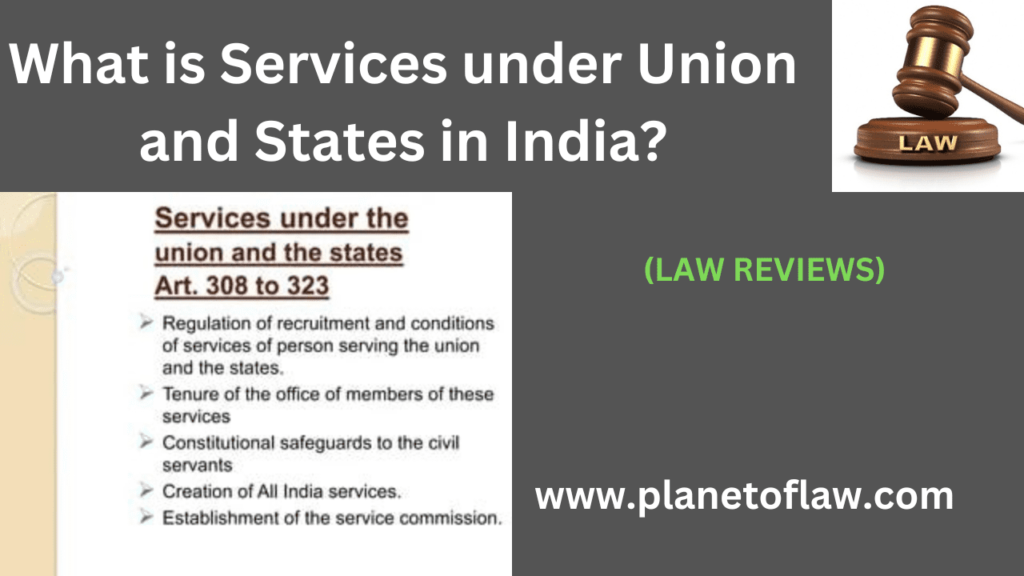The services under the Union and States in India refer to the various civil services that function at both the central (Union) and state levels. The functioning of these services is governed by the Constitution of India and other relevant laws. Here is an overview of how services work under the Union and States:
- Recruitment and Training:
- Union Public Service Commission (UPSC): The UPSC is responsible for conducting examinations for the recruitment of officers to the All India Services (IAS, IPS, IFS) and other central services.
- State Public Service Commissions (SPSC): Each state has its own SPSC responsible for conducting examinations for recruitment to state-level services.
- All India Services (IAS, IPS, IFS):
- Officers selected through the UPSC are allocated to different states and union territories by the central government.
- Members of All India Services are trained at institutions like the Lal Bahadur Shastri National Academy of Administration (for IAS and IFS) and Sardar Vallabhbhai Patel National Police Academy (for IPS).
- State Civil Services:
- Each state has its own set of civil services that include administrative, police, revenue, and other services.
- State Public Service Commissions conduct examinations for recruitment to state civil services.
- Roles and Responsibilities:
- Officers in All India Services serve both the Union and the respective states to which they are allocated.
- They play key roles in policy formulation, administration, and implementation of government programs and schemes.
- State civil service officers primarily serve within their respective states and contribute to state-level governance.
- Transfers and Mobility:
- Officers in All India Services may be transferred between states and the center to ensure a mix of experience and expertise.
- Transfers within state civil services are typically managed by state governments.
- Career Progression:
- Career progression in services is based on merit, experience, and performance.
- Officers can move up the ranks through promotions and can hold various positions at different levels of governance.
- Discipline and Conduct:
- The conduct and discipline of officers in services are governed by service rules and regulations.
- There are mechanisms for addressing issues related to misconduct, grievances, and disputes.
Overall, the system of services under the Union and States aims to provide a structured and efficient administrative framework for governance at both the central and state levels, ensuring uniformity and competence in public administration.
What is role of Public Service Commissions?
Public Service Commissions (PSCs) play a crucial role in the recruitment and appointment of government officials in India. Their main functions include conducting examinations, recommending candidates for various government services, and advising the government on personnel matters. Here are the key roles of Public Service Commissions:
- Conducting Recruitment Examinations:
- PSCs are responsible for conducting competitive examinations to select candidates for various civil services, both at the central and state levels.
- These examinations include the recruitment of officers to All India Services (IAS, IPS, IFS) and other central services, as well as state civil services.
- Recruitment for Various Services:
- PSCs recommend suitable candidates for appointment to different services and posts under the government.
- They ensure that the recruitment process is fair, transparent, and based on merit.
- Advice on Personnel Matters:
- PSCs advise the government on matters related to personnel management, such as methods of recruitment, promotions, transfers, and disciplinary actions.
- Conducting Interviews and Selection Procedures:
- In addition to written examinations, PSCs may conduct interviews and other selection procedures to assess the candidates’ suitability for specific posts.
- Determining Eligibility Criteria:
- PSCs establish the eligibility criteria for various examinations, taking into account educational qualifications, age limits, and other relevant factors.
- Promoting Equal Opportunity:
- PSCs strive to ensure equal opportunity in the recruitment process, promoting diversity and inclusivity in government services.
- Advising the Government on Service Rules:
- PSCs provide recommendations to the government on framing and amending service rules to enhance the efficiency and effectiveness of public administration.
- Fairness and Impartiality:
- PSCs operate independently, and their decisions are expected to be free from political influence. This independence ensures fairness and impartiality in the recruitment process.
- Monitoring and Evaluation:
- PSCs may monitor the progress of candidates during probation and provide evaluations to ensure that appointed officials meet the required standards of performance.
- Periodic Review of Recruitment Policies:
- PSCs periodically review and update recruitment policies to align them with changing societal needs, technological advancements, and administrative requirements.
Public Service Commissions are instrumental in shaping the composition of the civil services, ensuring that government officials are selected based on merit and competency. Their role contributes significantly to maintaining a professional and efficient public administration system.
Critical Analysis of Services under the Union & States –
A critical analysis of the services under the Union and States in India involves examining the strengths, weaknesses, and challenges associated with the functioning of civil services at both central and state levels. Here are some key points for consideration:
Strengths:
- Expertise and Specialization: The All India Services, such as IAS, IPS, and IFS, bring together officers with diverse expertise. This can contribute to effective governance and policy implementation.
- Uniformity in Administration: All India Services promote uniformity in administration as officers can serve in both the Union and States, ensuring a consistent approach to governance.
- Merit-Based Recruitment: The recruitment process through competitive exams conducted by UPSC is designed to select candidates based on merit, ensuring a high standard of competence in civil services.
- Career Progression: The services provide opportunities for career progression based on merit, experience, and performance, which can motivate officers to excel in their roles.
Weaknesses:
- Bureaucratic Inefficiencies: The bureaucratic structure can sometimes lead to inefficiencies and delays in decision-making and implementation of policies.
- Lack of Specialization: While officers may have diverse backgrounds, the generalist nature of some services, like the IAS, may lead to a lack of specialization in certain areas.
- Transfers and Political Interference: Frequent transfers and political interference can affect the stability and efficiency of the administrative machinery, compromising the effectiveness of officers.
Challenges:
- Capacity Building: Ensuring continuous training and capacity building to keep up with evolving challenges and technologies is a persistent challenge for the civil services.
- Corruption and Ethics: Instances of corruption and ethical lapses among a few officers can tarnish the reputation of the entire civil services system.
- Citizen-Centric Approach: Balancing administrative requirements with a citizen-centric approach and responsiveness to public needs is an ongoing challenge.
- Diversity in Governance: India is a diverse country with varied regional needs. Balancing the centralized structure of All India Services with the need for localized governance is a challenge.
Recommendations for Improvement:
- Training and Skill Development: Continuous training programs to enhance technical and managerial skills should be emphasized to keep officers updated with best practices.
- Specialization and Flexibility: Introduce mechanisms to allow officers to specialize in specific domains while maintaining the generalist nature of the services.
- Decentralization and Autonomy: Promote decentralization of decision-making to empower state administrations and reduce bureaucratic red tape.
- Ethical Standards: Strengthen mechanisms for maintaining high ethical standards within the services, and ensure swift action against instances of corruption or misconduct.
In conclusion, while the services under the Union and States have several strengths, addressing weaknesses and challenges is essential for creating a more efficient, accountable, and citizen-centric administrative system in India. Continuous reforms and adaptation to changing needs can contribute to the overall improvement of the civil services.
Conclusion –
In conclusion, the system of services under the Union and States in India represents a critical component of the country’s administrative machinery. The structure includes both the prestigious All India Services, such as IAS, IPS, and IFS, as well as the diverse civil services at the state level. This dual-level administrative framework is designed to balance national unity and efficiency with the recognition of regional diversity.
The All India Services, with their unique characteristics of mobility and a blend of generalist and specialist expertise, contribute to uniformity in governance across the country. The recruitment process, conducted by the Union Public Service Commission (UPSC) and State Public Service Commissions (SPSC), emphasizes merit-based selection and training to ensure a high standard of competence.
However, the system is not without challenges. Bureaucratic inefficiencies, issues related to transfers, and occasional political interference pose hurdles to the smooth functioning of these services. Striking the right balance between a centralized approach and decentralized governance remains an ongoing challenge.
To enhance the effectiveness of services under the Union and States, continuous efforts are needed. This includes reforms to address bureaucratic shortcomings, promotion of specialization within the services, and a focus on ethical conduct. Emphasizing citizen-centric governance and responsiveness to evolving societal needs should guide future developments in the realm of public administration.
In essence, the services under the Union and States serve as the backbone of India’s administrative structure, influencing the nation’s development and progress. A commitment to excellence, adaptability to changing circumstances, and a dedication to public service will be crucial for ensuring that these services effectively meet the dynamic challenges of the 21st century.

